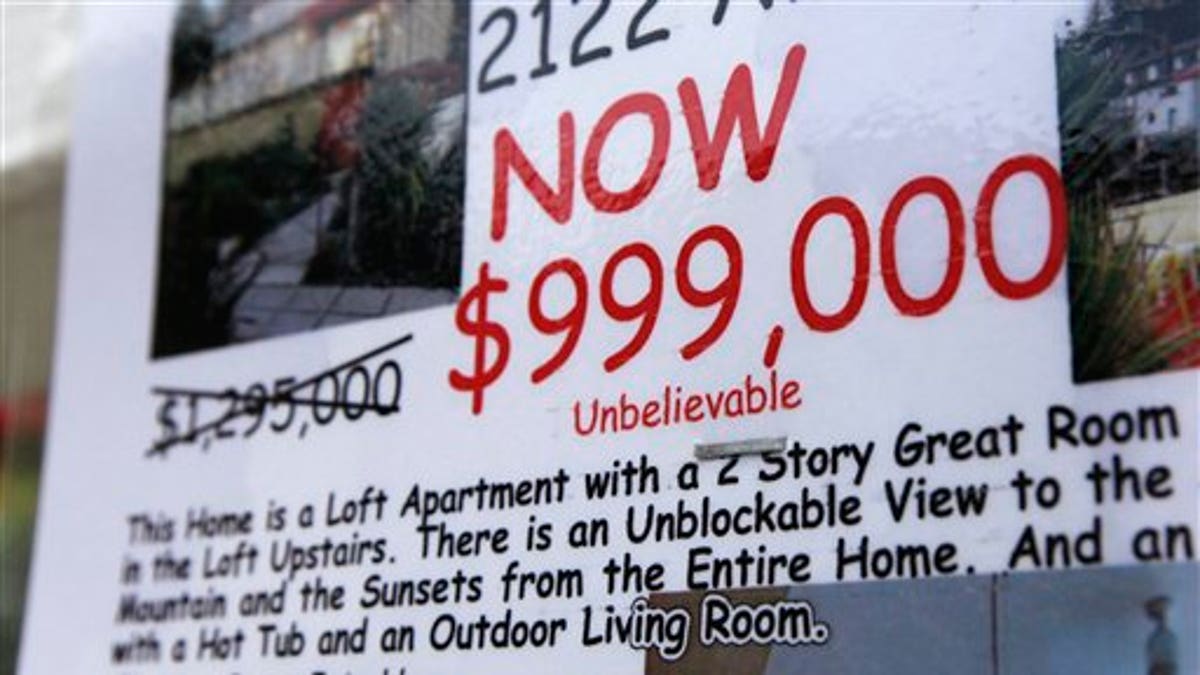
June 2011: A condo with a view and a reduced price is advertised for sale, in Seattle. (AP)
The past month wasn't exactly a confidence-booster for would-be home buyers and sellers.
They've witnessed a turbulent stock market, a downgrade of U.S. credit, a spreading European debt crisis and a U.S. economy that seems to be running in place.
And now many say they're even more hesitant — a retreat that could further delay a rebound in housing. It could hold back the overall economy, too.
"I have people who are just waiting and waiting, who just haven't pulled the trigger even though they have the down payment," said John Stearns, senior mortgage banker at American Fidelity Mortgage outside Milwaukee. "There's a lot of kicking tires. A lot of people saying they just won't do it."
Their unease explains why applications for home mortgages sank last week to a nearly 15-year low. What's more, sales of new homes fell more than expected in July — and analysts think the financial turmoil may be accelerating that slide this month.
"Buyers just don't want to commit to anything right now," said Joel Naroff of Pennsylvania-based Naroff Economic Advisors.
Interviews with more than three dozen agents, brokers and would-be buyers and sellers indicate that the heightened uncertainty in the financial markets and the economy has made people even more cautious than before.
Consider:
— Eric Younan, a marketing professional at an accounting firm who was about to buy a home in July in Farmington Hills, Mich. Then along came August. "What really scared me is that I'm a single guy, and I don't want to have a mortgage by myself," Younan says. "The economy is taking a pounding, and my friends who are getting laid off are leaving the state. Prices are still falling. So I'd rather have money in the bank than money in a house."
— Fernando Maza, a security system programmer in Broward County, Fla., who was about to buy a second home, right before the stream of unnerving developments on the economy and the stock market. Now, he's less sure. "House prices could go down," he says. "There's so much inventory and not a lot of qualified buyers."
— Kurt Winiecki, a financial planner in Chicago who has been counseling a young couple on whether to buy or continue to rent. August made Winiecki's decision easier: He's telling them to rent. "What if they lose 20 percent of their equity and they can't sell the house? It's just too big a risk."
Even before the recent financial upheavals, the home market was being depressed by the economy's many problems: High unemployment. Stagnant pay. Rising health care expenses. High debt loads. A wave of foreclosures. Shrunken home equity.
And real estate agents were saying that more buyers were walking away at the last minute. In June, the latest month for which figures are available, about 16 percent of closings were canceled. That was the highest figure since record keeping started more than a year ago.
This year is on pace to be the worst for home sales in 14 years. Nationally, prices are at 2002 levels, and even lower in areas like Phoenix, Las Vegas and Tampa, Fla.
But the past few weeks' turmoil may be making everything worse. Homebuilder stocks, for instance, have been battered — even more than the stock market as a whole. As a group, they've shed nearly 23 percent, according to a Standard & Poor's analysis, compared with about 12 percent for the Dow Jones industrial average.
In normal times, today's record-low mortgage rates would energize buying. Yet while more people are refinancing, applications for new mortgages are stuck at 10-year lows, according to Inside Mortgage Finance.
Part of the problem is that many people can't buy even if they want to. More than 23 percent of homeowners owe more on their homes than they're worth. An additional 25 percent have less than 20 percent equity in their homes, according to Capital Economics.
That means that nearly half of homeowners couldn't qualify for a new mortgage because they couldn't produce a big enough down payment.
Add to that a chaotic stock market and a weak economy, and the belief is taking hold among many that now isn't the time to invest in the biggest purchase in most people's lives.
"There's a reassessment of risk across the planet," says Jonathan Miller of New York-based real estate consultancy Miller Samuel. "Volatility breeds uncertainty, and this is intimidating for consumers."
Consider the lack of interest in Eric Johannson's home. A pilot for cargo hauler Atlas Air, Johannson put his lakefront Houston home on the market in July 2010. He planned to upgrade to a home in Orlando, where his wife took a new job.
Yet despite the house's excellent condition, it has drawn not a single offer, even after the price was slashed to $249,000 — $100,000 less than what Johannson and his wife paid in 2008.
"If this economic situation drags out much longer, my wife just may have to quit her job and career" and move back to Houston, Johansson says.

